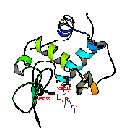|
Chemistry: G25.2601
Biology: G23.2601
Mathematics: G63.2856.003
Computer Science: G22.3033.11
Sackler: G16.2607
Time: Thursdays, 12:45-2:45pm
Location: 1003 Main Building
Content: Introduction to biomolecular modeling and
simulation, including:
-
Protein and Nucleic
Acid Structure and Dynamics - minitutorial;
-
Modeling Approaches - quantum and molecular
mechanics, molecular dynamics, Monte Carlo;
-
Force Fields - functional construction,
variability, evaluation tricks of the trade;
-
Molecular Visualization Simulation -
introduction to the INSIGHT package;
-
Selected Topics - protein folding,
RNA folding, DNA dynamics, structural and functional genomics.
Intended
Audience: |
Advanced undergraduates and graduate students, from all Washington
Square science and math departments (chemistry, biology, physics, mathematics,
computer science and neuroscience), as well as graduate students from the
Sackler Institute of Graduate Biomedical Sciences |
| Prerequisites: |
Computing experience and interest in the subject |
| Textbook: |
Understanding Molecular Simulations. From Algorithms to Applications
by Daan Frenkel and Berend Smit (Academic Press, 1996). The book will not
be rigorously followed and supplemented by articles, additional books,
web sites, and professor's notes. |
| Format: |
Class lectures (instructor and guests), student presentations, videos,
and computer labs (homework) |
| Homework: |
Weekly readings, assignments with modeling software, some programming
assignments, group projects, and term paper (some flexibility permitted
based on background) |
| Grading: |
Based on homework, group projects, and term paper |
| Instructor: |
Tamar Schlick, Professor (Chemistry, Mathematics, Computer Science)
and HHMI Investigator. See group web site on http://monod.biomath.nyu.edu |
For further information, contact T. Schlick by email (schlick@nyu.edu)
phone (998-3116) or fax (995-4152).
|


